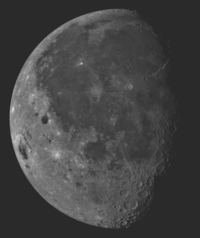Procellarum basin

Oceanus Procellarum is the large mare in the center and upper left of this image.
|
|
| Coordinates | 18°24′N 57°24′W / 18.4°N 57.4°WCoordinates: 18°24′N 57°24′W / 18.4°N 57.4°W |
|---|---|
| Diameter | 2,592 km (1,611 mi) |
| Eponym | Ocean of Storms |
Oceanus Procellarum (/oʊˈsiːənəs ˌprɒsᵻˈleɪrəm/; Latin for "Ocean of Storms") is a vast lunar mare on the western edge of the near side of the Moon. It is the only one of the lunar maria to be called an "Oceanus" (ocean), due to its size: Oceanus Procellarum is the largest of the maria, stretching more than 2,500 km (1,600 mi) across its north-south axis and covering roughly 4,000,000 km2 (1,500,000 sq mi).
Like all lunar maria, Oceanus Procellarum was formed by ancient basaltic flood volcanic eruptions that covered the region in a thick, nearly flat layer of solidified magma. Unlike the other lunar maria, however, Oceanus Procellarum may or may not be contained within a single well-defined impact basin. Around its edges lie many minor bays and seas, including Mare Nubium and Mare Humorum to the south. To the northeast, Oceanus Procellarum is separated from Mare Imbrium by the Carpathian Mountains. On its north-west edge lies the 32 km wide Aristarchus ray crater, which is considered as the brightest feature on the Near side of the Moon. Also, the more-prominent ray-crater Copernicus lies within the eastern edge of the mare, distinctly with its bright ray materials sprawling over the darker material. On the northern edge of Oceanus Procellarum lies Sinus Roris.
...
Wikipedia
